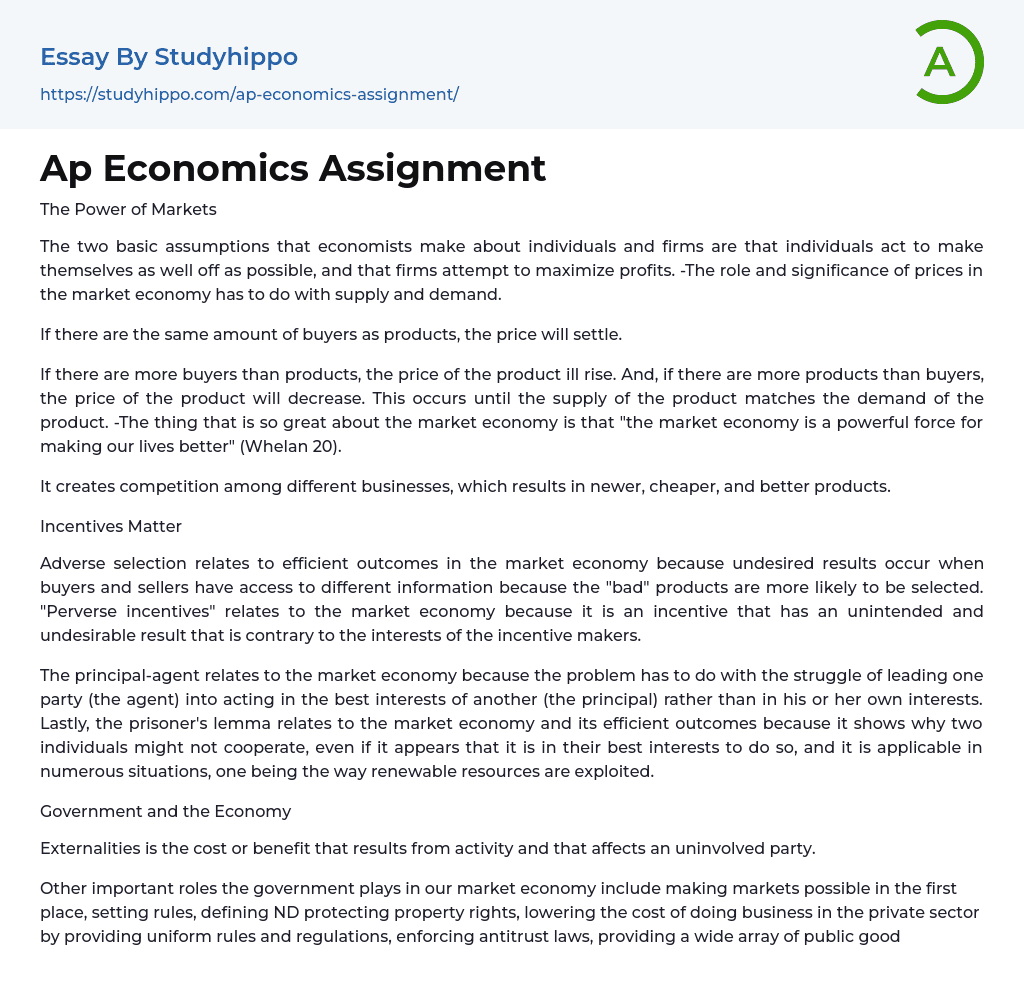The Power of Markets
Economists presume that individuals and firms both endeavor to maximize their own welfare, with individuals seeking personal well-being and firms striving for profit maximization. The market economy relies on the interaction between supply and demand to establish the importance and impact of prices. When the number of buyers equals the quantity of available products, an equilibrium price is achieved.
When supply is limited and demand exceeds it, the price of a product will rise. Conversely, when there are more products available than buyers, the price will decrease. This process continues until a balance between supply and demand is reached.
The market economy plays a crucial role in improving our lives by fostering competition among businesses. This competition leads to the creation of newer, cheaper, and better products (Whelan 20).
The Importance of Incenti
...
ves
In a market economy, adverse selection occurs when buyers and sellers possess different information. As a result, undesirable outcomes arise as "inferior" products become more likely to be selected.
"Perverse incentives" in the market economy are unintended and undesirable outcomes that go against the interests of those who created them. The principal-agent problem occurs when one party (the agent) struggles to act in the best interests of another (the principal) instead of their own interests. The prisoner's lemma explains why individuals may not cooperate, even if it seems to be in their best interests, and is relevant in various scenarios, including the exploitation of renewable resources.
Regarding the government's role in the economy, externalities refer to costs or benefits that affect a party not directly involved in an activity. The government also fulfills important roles such as establishing markets, defining and
View entire sample
Join StudyHippo to see entire essay
ves
In a market economy, adverse selection occurs when buyers and sellers possess different information. As a result, undesirable outcomes arise as "inferior" products become more likely to be selected.
"Perverse incentives" in the market economy are unintended and undesirable outcomes that go against the interests of those who created them. The principal-agent problem occurs when one party (the agent) struggles to act in the best interests of another (the principal) instead of their own interests. The prisoner's lemma explains why individuals may not cooperate, even if it seems to be in their best interests, and is relevant in various scenarios, including the exploitation of renewable resources.
Regarding the government's role in the economy, externalities refer to costs or benefits that affect a party not directly involved in an activity. The government also fulfills important roles such as establishing markets, defining and
protecting property rights, reducing business costs through uniform regulations, enforcing antitrust laws, providing public goods, and redistributing wealth.
Government and the Economy II
It is crucial for the government to have a limited role in the market economy because when it controls numerous crucial sectors, it compromises potential advantages of competition for businesses.
"when the government controls some element of the economy, scarce resources are allocated by autocrats or restaurants or politicians rather than by the market" (Whelan 85). Moreover, government regulations are widespread, and their costs frequently outweigh their benefits.
Economics of Information
The market economy is compromised by informational asymmetry, which relates to insurance companies utilizing deductibles to influence customer behavior.
Productivity and Human Capital
I agree with Wheeler's argument that Bill Gates deserves his wealth because even without his current riches, Gates' human capital would have made him wealthy. Wheeler emphasizes that our concern should be focused on the amount of resources the poor receive instead of comparing it to what the rich receive.
Financial Markets
Get-rich-quick schemes defy basic economic principles as successful investments require a gradual accumulation of wealth with occasional setbacks (Whelan 149).
When it comes to investing in the stock market, one interesting piece of advice I came across is that keeping your investments for a longer duration enhances their likelihood of succeeding. It's crucial to bear in mind that the Federal Reserve has the power to increase interest rates. Moreover, deflation refers to a consistent decrease in prices and can be more harmful than inflation. The reason behind this is that lower prices prompt consumers to delay
their purchases, leading to a decline in asset prices as well. As a result, individuals experience a reduction in wealth and have less inclination towards spending money. Ultimately, this decrease in consumer spending contributes to slower economic growth.
- Finance essays
- International Business essays
- Macroeconomics essays
- Barriers To Entry essays
- Microeconomics essays
- Pricing essays
- Profit essays
- Consumerism essays
- Export essays
- Free Trade essays
- International Trade essays
- Compensation essays
- Monopoly essays
- Trade essays
- Industry essays
- Warehouse essays
- Economic Development essays
- Economic Growth essays
- Inflation essays
- Taxation essays
- Central Bank essays
- Monetary Policy essays
- Economy essays
- Gross Domestic Product essays
- Recession essays
- Capitalism essays
- Economic System essays
- Materialism essays
- World economy essays
- American Dream essays
- resources essays
- Max Weber essays
- Employment essays
- Minimum Wage essays
- Unemployment essays
- Human Development essays
- Income Inequality essays
- Economic Inequality essays
- Money essays
- Financial Accounting essays
- Market Segmentation essays
- Supply And Demand essays
- Purchasing essays
- Forecasting essays
- Legacy essays
- Bank essays
- Corporate Finance essays
- Financial News essays
- Financial Ratios essays
- Financial Services essays




